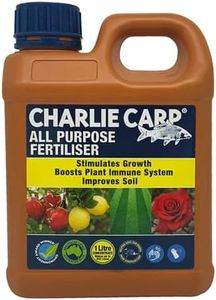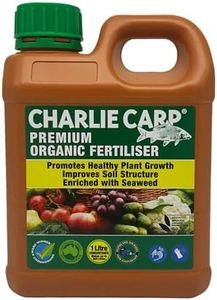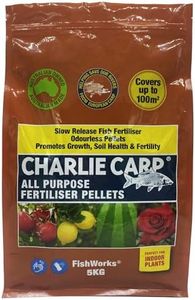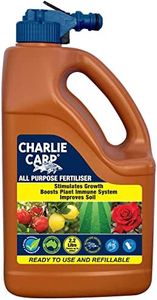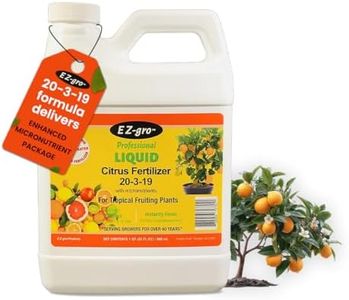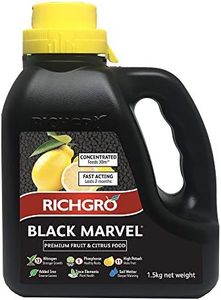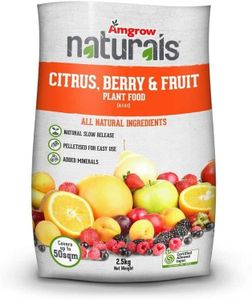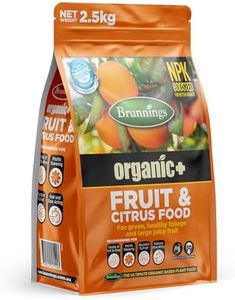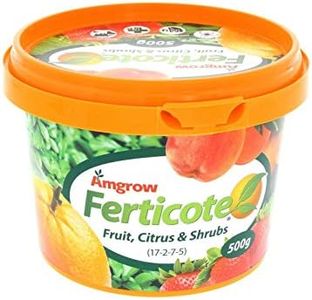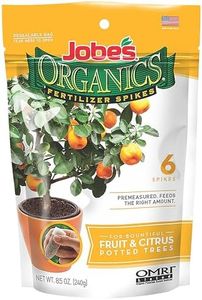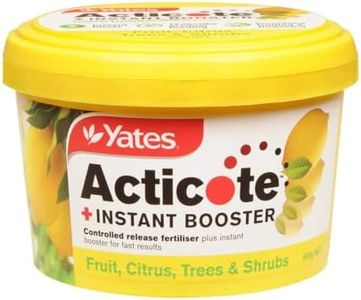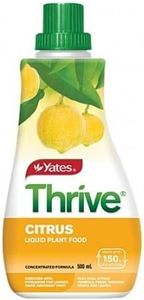We Use CookiesWe use cookies to enhance the security, performance,
functionality and for analytical and promotional activities. By continuing to browse this site you
are agreeing to our privacy policy
10 Best Citrus Fertilizers
From leading brands and best sellers available on the web.By clicking on a link to a third party's website, log data is shared with that third party.
Buying Guide for the Best Citrus Fertilizers
Choosing the right citrus fertilizer is key to growing healthy, strong, and fruit-bearing citrus trees. Citrus plants have specific needs at different growth stages, and the right fertilizer provides essential nutrients to help them thrive. Picking the best fertilizer depends on understanding what your citrus plant requires, your local soil conditions, and how you’ll apply the fertilizer. It’s important to familiarize yourself with the key aspects of fertilizer labels and match them to your plant’s needs for successful gardening.N-P-K RatioThe N-P-K ratio stands for Nitrogen (N), Phosphorus (P), and Potassium (K), which are the three main nutrients in fertilizers. This ratio influences leafy growth, root development, and fruit quality. The first number indicates nitrogen, which helps in leaf and stem growth; the second is phosphorus for root and flower development; and the third is potassium for fruit quality and disease resistance. Ratios are often shown like 6-4-6 or 8-3-9. Higher nitrogen suits young trees or those needing leafy growth, while a balanced or slightly higher potassium figure is beneficial for fruiting trees. To decide, consider your tree’s age and whether you want vegetative growth or more fruit, then select a ratio tailored to those needs.
MicronutrientsMicronutrients such as magnesium, iron, zinc, manganese, and copper are necessary in small amounts for overall plant health and to prevent deficiencies like yellow leaves or poor fruit set. Not all fertilizers supply these, so checking the label is important. Citrus trees often benefit from extra magnesium and iron, especially if grown in containers or in poor soils. If your plants show signs of specific deficiencies, opt for a fertilizer that lists these micronutrients, or supplement as needed; otherwise, if your soil is already rich, basic coverage might suffice.
Fertilizer FormCitrus fertilizers come in various forms, including granular, liquid, and spikes. Granular fertilizers are sprinkled on the soil and provide slow, extended feeding. Liquids are diluted and applied during watering, offering quick nutrient uptake. Spikes are inserted into the soil and release nutrients gradually. Your choice depends on your maintenance preferences and how controlled or convenient you want the feeding process to be. If you prefer occasional feeding, granular or spikes are low-maintenance; if you like frequent attention and quick results, liquids are a good pick.
Release TypeRelease type refers to how quickly the nutrients become available to the plant. Slow-release fertilizers feed plants over several weeks or months, which helps prevent overfeeding and reduces how often you need to reapply. Fast-release options work quickly but might require more frequent applications. If you want to avoid regular fertilizing, slow-release is practical; for addressing specific nutrient problems quickly, a fast-release formula is more suitable.
Organic vs. SyntheticFertilizers can be organic, made from natural sources, or synthetic, manufactured chemically. Organic fertilizers improve soil health by supporting beneficial microbes and provide a slow, steady nutrient source, good for overall plant and soil improvement. Synthetic fertilizers deliver nutrients quickly and predictably, which can be useful for rapid fixes. If you prioritize soil health and eco-friendliness, go organic; if immediate results are more important or your soil lacks specific nutrients, a synthetic option might make more sense.
Soil CompatibilitySome fertilizers are formulated for specific soil types or pH ranges. Citrus prefers slightly acidic to neutral soils, and incorrect soil compatibility can lead to nutrient lockout. Consider testing your soil’s pH before choosing a fertilizer, and look for those that help maintain or slightly lower pH if your soil is too alkaline. This helps ensure your citrus trees can absorb all the nutrients provided.
